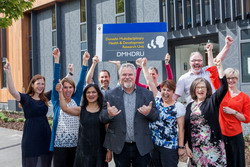The research team involved in the groundbreaking Dunedin Study at the University of Otago have been awarded the prestigious Prime Minister's Science Prize (2016).
The $500,000 award was presented to Director of the Dunedin Multidisciplinary Health and Development Research Unit, Professor Richie Poulton, yesterday in Wellington by Prime Minister Bill English.
The Dunedin Study is the most detailed of its kind in the world. Hundreds of international studies with significant societal impact have come from assessments of a cohort of 1037 children born at Queen Mary Maternity Hospital in 1972-73. There are still 961 study members participating, representing 95 per cent of those still alive. Thirty-eight have died.
About 55 per cent live in the South Island, 30 per cent of those still in Dunedin, with about 20 per cent in the North Island, 15 per cent in Australia and about 10 per cent in the Northern Hemisphere.
Last year the HRC awarded the Dunedin Study almost $5 million dollars over five years for a life-course study on aging to inform early intervention strategies. That builds on more than 40 years of historic investment in the study by the HRC.
HRC-funded research has featured prominently in the PM Science Prizes. In 2014, the PM Science Prize was presented to another longtime HRC-funded study, the He Kainga Oranga/Housing and Health Research Programme, led by Professor Philippa Howden-Chapman. This recognised their work into nationwide housing deficiencies, especially affecting children, the elderly and those with chronic health problems. And in 2015, the top prize went to the Bone and Joint Research Group at the University of Auckland led by Professors Mark Bolland and Andrew Grey and Distinguished Professor Ian Reid, for their HRC-supported research.
For more information, visit the Prime Minister's Science Prizes website.
